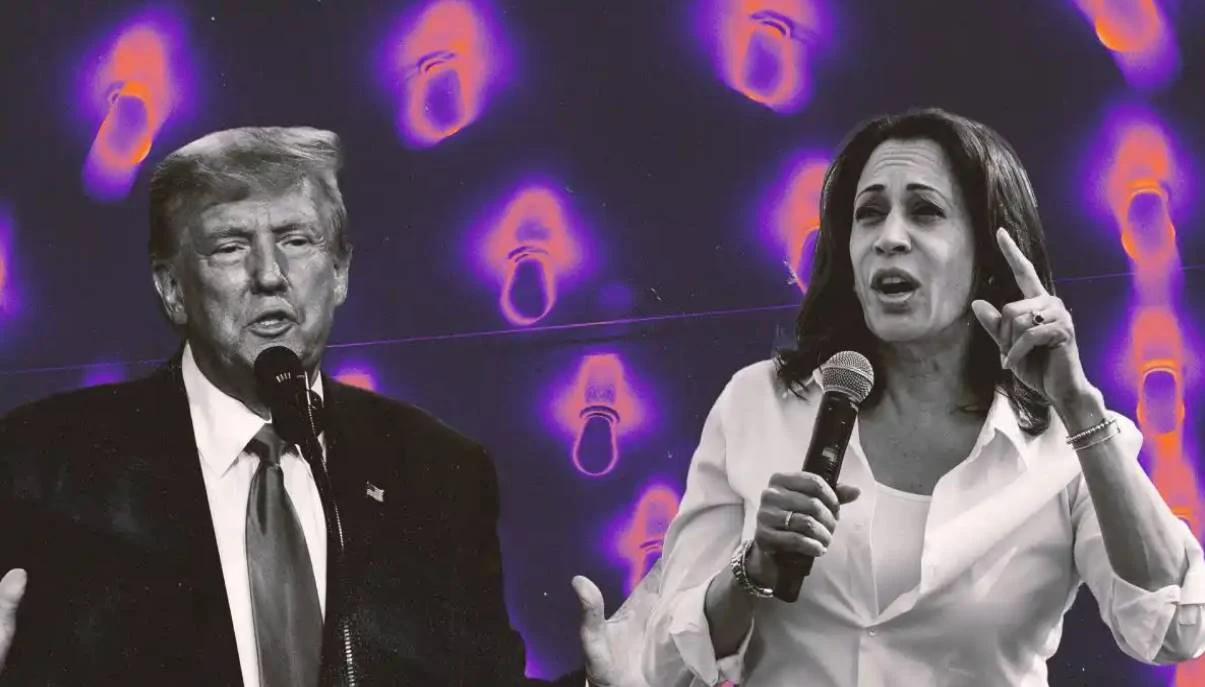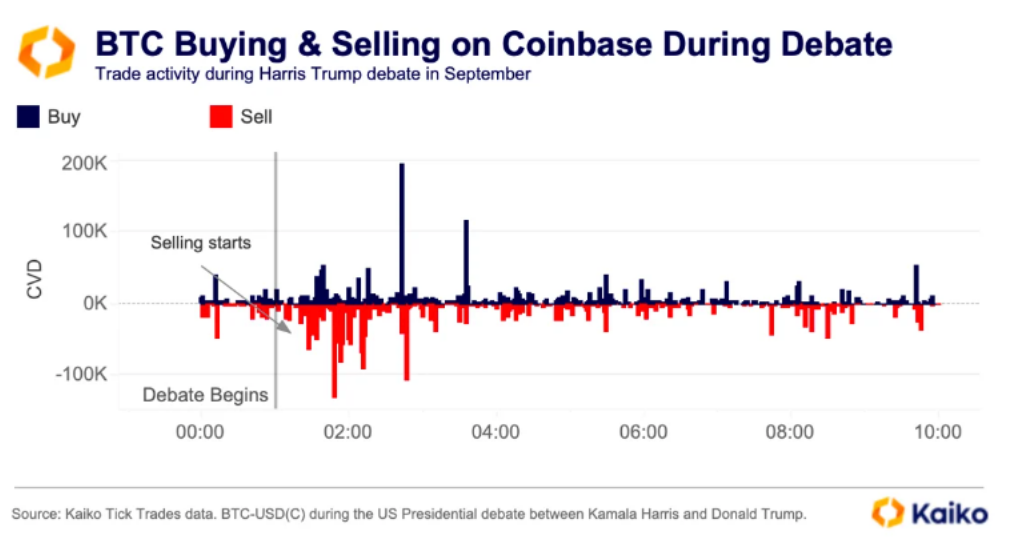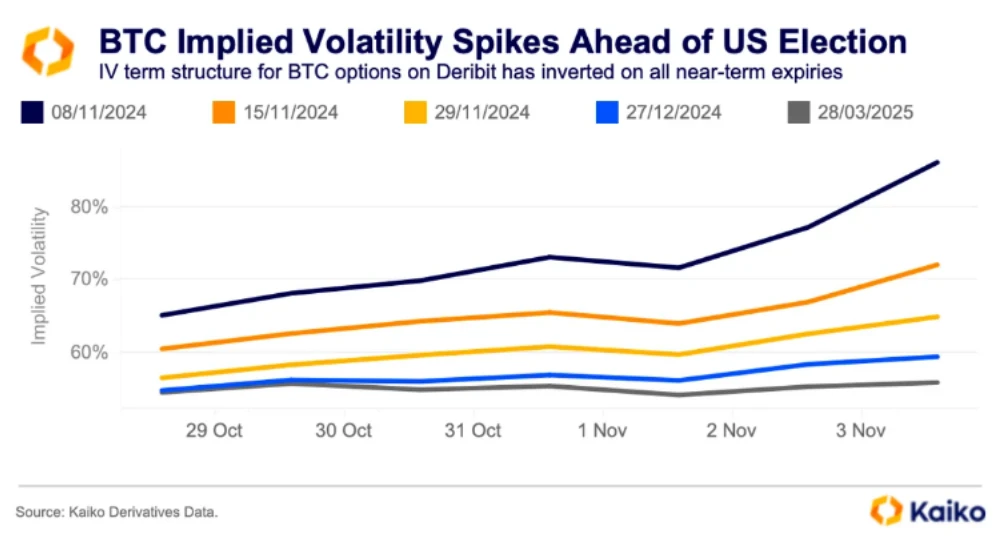Im Endkampf der Wahl können wir sehen, was das Smart Money im Bereich der Kryptowährungen tut
Originalautor: James Hunt
Originalübersetzung: Vernacular blockchain

Election day is here in the US, and the 24/7 trading nature of the Kryptocurrency market offers an advantage over traditional market trading hours. Kaiko analysts outline three key indicators to watch as the election results are announced.
1. Transaction data
First, observing the transaction-by-transaction data on major platforms can provide insights into the movements of smart money. By calculating the cumulative volume delta (CVD) on a transaction-by-transaction basis, the net buying and selling activity of global crypto trading platforms can be measured. Kaiko analyst Adam Morgan McCarthy said that this indicator provided valuable insights during the presidential debate between Trump and Kamala Harris and is expected to play a role again during the election. During the September debate, CVD turned negative, indicating that the market reacted bearishly to Trumps performance because Harris was seen as less friendly to the crypto industry in comparison, while Trump showed a clear pro-crypto stance.

CVD on Coinbase during the presidential debate
Image credit: Kaiko
Analysts explained that by breaking down tick-by-tick trades into buys and sells, it is possible to observe the strong selling pressure from the market’s real-time reaction to Trump’s performance. This helps with market timing, showing when buying and selling pressures abate and providing clues to participants’ expectations.

BTC buying and selling on Coinbase during the presidential debate
Image credit: Kaiko
2. Funding Rate
According to Kaiko’s analysis, the second indicator to watch is the funding rate. Leveraged traders are very sensitive to sudden changes, which may lead to squeezes or chain liquidations in the market, whether it is rising or falling.
Higher funding rates typically indicate heightened speculative activity in Bitcoin perpetual contracts. In March, when Bitcoin broke through $73,000 to hit an all-time high, funding rates surged above 0.05%. However, last week, when Bitcoin was close to the same level, funding rates remained around 0.01% on BN and Bybit, the two largest perpetual contract platforms, suggesting that traders’ confidence has declined ahead of the election, McCarthy said.
BN adjusts the funding rate every eight hours, with the first adjustment at 12 noon EST and then at 8 pm after the East Coast vote closes. The next adjustment will be at 4 am EST on Wednesday, when the election results may be clearer.
3. Implied Volatility
Finally, implied volatility (IV) is also a key indicator in the derivatives market that shows how participants are pricing risk. IV is a forward-looking indicator that predicts the expected volatility of an asset over a given time frame. It aggregates multiple data points into a single number, allowing traders to determine whether an option is relatively cheap or expensive.
Monitoring the IV term structure helps traders anticipate potential market risks. An inversion of the IV term structure, where short-term IV is higher than long-term IV, often signals an upcoming risk event, such as the U.S. election, Kaiko analyst explained.
Bitcoins recent rally to near all-time highs caused a spike in short-term IV, catching traders off guard and prompting them to adjust their positions. The change affected the IV smile, a pattern that shows higher implied volatility for options that are slightly higher or lower than current prices. A rightward tilt in the IV smile suggests that the market is expecting upward price volatility, while a leftward tilt suggests that the market is concerned about potential price declines. The recent changes highlight how traders can hedge against expected price volatility, he added.

Bitcoin Implied Volatility Ahead of the US Election
Image credit: Kaiko
Ultimately, markets are driven by supply and demand and influenced by the actions of participants, but McCarthy noted that the accuracy of predicting these trends remains uncertain because traders are not infallible.
4. Prediction markets and polls diverge when outcomes are uncertain
Currently, Trumps chances of winning are 62% and Harriss are 38% on the decentralized platform Polymarket, which has traded $3.25 billion on presidential election results, making it the largest prediction market to date. On the regulated Kalshi platform, Trumps chances of winning are 57% and Harriss are 43%. However, Bernstein analysts pointed out on Monday that the national poll average results are still close, with Harris leading by 1%, within the margin of error.
Kaiko previously noted that the level of open interest on Polymarket indicated that the platform lacked sufficient liquidity to place bets on the US election, and its predictive power was controversial. Others have pointed out that prediction markets have had mixed performance in elections, that large players could distort the market, or that there could be potential bias due to the dominance of male, crypto-native users, and non-US traders on the platform, analysts at crypto trading firm and market maker GSR mentioned this week.
However, after the odds of the two candidates briefly converged over the weekend, Gautam Chugani, head of digital assets at Bernstein, said: For those who believe that Polymarket data is manipulated by Trumps bias, we believe that the weekends trading data is enough to prove that it operates like any public market and that traders are easily spooked by the escalating poll data.
Additionally, proponents of prediction market accuracy point to the focus on voter turnout polls rather than the Electoral College vote, and the use of retrospective polls in election models as key factors. They also highlight that the odds of most betting markets are similar to Polymarket, suggesting that market manipulation is unlikely. GSR adds that academic research shows that prediction markets are often more accurate than surveys or expert opinions, with transparency, collective intelligence, and market dynamics driving odds toward accuracy.
Kaiko pointed out that Pennsylvania, North Carolina, Georgia, Michigan, Wisconsin, Arizona and Nevada are key states to watch on election night, especially Pennsylvania. If Harris loses her 19 electoral votes, according to some polls, the path to the White House will become extremely difficult or even almost impossible.
Currently, on Polymarket, Trump leads in Arizona, Georgia, Nevada, North Carolina, and Pennsylvania, while Harris leads in Wisconsin and Michigan.
5. Expected impact on Bitcoin price
Greg Magadini, head of derivatives at Amberdata, told The Block that he expects the price of Bitcoin to fluctuate between $6,000 and $8,000 after the election. If Harris wins, it may fall to the $60,000 level; if Trump wins, it may break through $75,000 to set a new record high.
BRN analyst Valentin Fournier also agreed, predicting a post-election price volatility of about 10% for Bitcoin, with a positive impact expected if Trump wins and a possible price correction if Harris wins. However, the medium- to long-term outlook for Bitcoin remains positive regardless of the election outcome, Fournier noted.
On Monday, Bernstein analysts said they expect Bitcoin to reach $80,000 to $90,000 by the Jan. 20 presidential inauguration if Trump wins, but warned that if Harris wins, Bitcoin could fall to $50,000 in the same period before recovering.
According to The Blocks Bitcoin price page, Bitcoin is currently trading at $68,828. Bitcoin is down about 4% over the past week but is up 63% this year.
Meanwhile, the GMCI 30 index, which represents the 30 largest cryptocurrencies, has fallen about 7% over the past seven days and is currently at 120.08, but is up about 21% in 2024.

This article is sourced from the internet: In the final battle of the election, we can see what the smart money is doing in the cryptocurrency field
Original锝淥daily Planet Daily ( @OdailyChina ) Author: Wenser ( @wenser 2010 ) In September this year, the crypto market had a rare harvest – according to Bloomberg , global interest rate cuts pushed Bitcoin to one of the largest gains in September in history. Compared with the average decline of 5.9% in September in the past decade, the price of Bitcoin has risen by more than 10% in September this year. Under the influence of the unprecedented 50 basis point rate cut news of the Federal Reserve, the liquidity of the cryptocurrency market is also expected to be replenished again. At the same time, at the Token 2049 Singapore event, an industry event that ended in September, the old exchange CoinW, founded in 2017, made a grand appearance as a…







